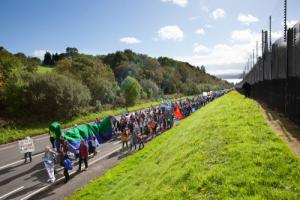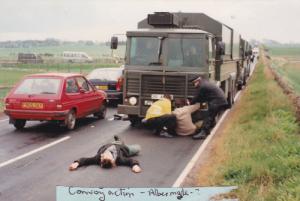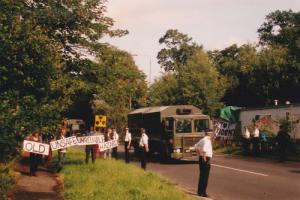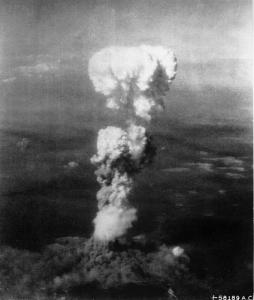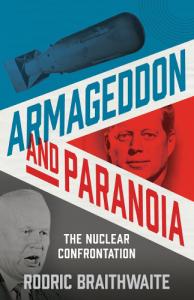Devonport and Rosyth dockyards cannot host Britain’s Trident submarines, which carry nuclear missiles, because they are full up with 20 obsolete nuclear submarines which have not been decommissioned. Nine of these subs still hold nuclear fuel. The public accounts committee criticised the ministry of defence for its lack of action in late September.
The infrastructure supporting Britain’s nuclear submarine fleet is no longer ‘fit for purpose’, according to the parliamentary select…
Nuclear weapons
For a few hours on 22 September, the gate to Faslane, the Clyde estuary home of the UK’s Trident submarines, became a ‘hostile environment’ for nuclear weapons.
In putting together the ‘Nae Nukes, Anywhere’ event, Scottish CND planned something more than a demo or a protest. The vision was for a celebration of transnational…
In early August, the annual fast in remembrance of the Hiroshima and Nagasaki bombings was held in seven countries.
In London, four people fasted behind the ministry of defence in Whitehall. They also held a demo outside Downing Street urging the UK to sign the UN global ban on nuclear weapons.
Long-time Scottish peace activists Janet Fenton and Brian Quail fasted in Edinburgh and Glasgow. In…
In mid-September, Voices for Creative Nonviolence US held an eight-day ‘Disarm Trident’ peace walk along the east coast of the USA. The walk was in solidarity with the Kings Bay Ploughshares 7, Catholic peace activists who entered the Trident submarine base in Kings Bay, Georgia, in April to carry out disarmament. (PN 2618–2619) Three are out on bail, four are still inside.
Write to the prisoners! If you can... the prison only accepts ‘pre-stamped’ postcards; we’re not…
We can cancel Trident replacement without massive job losses. Defence Diversification, a report published by the Nuclear Education Trust in June, sums up lessons in conversion from Estonia, Germany, Italy, South Africa and the US.
One lesson is that ‘workers and communities must take the lead in making decisions’, as part of ‘a broad partnership’ including every interest that’s involved.
Also: it’s better to have a five-year plan for diversification and to take…
On 7 July, the synod of the Church of England decided (by 260 to 26) to call on the British government to ‘respond positively’ to the Treaty on the Prohibition of Nuclear Weapons.
There was an attempt to strengthen the wording to ask the government to actually sign the treaty, but that amendment was lost.
The motion asks the government to explain its strategy for meeting its obligations under Article VI of the Nuclear Non-Proliferation Treaty: ‘to pursue negotiations in…
The 26th annual conference of the Global Network Against Weapons & Nuclear Power in Space (GN) was held from 22–24 June at the Friends Meeting House in Oxford.
Will Griffin, Mary Beth Sullivan and I went a week early to Leeds and GN board convener Dave Webb organised talks…
On 17 May, three of the Kings Bay Ploughshares Seven were released on bail at a court hearing. Martha Hennessy, Carmen Trotta, and Patrick O’Neill posted a $50,000 bond (with either $1,000 or $5,000 paid in cash), surrendered their passports and are now wearing ankle monitors under house arrest.
Liz McAlister, Clare Grady, and Mark Colville refused the conditions and stayed in Glynn county jail. Steve Kelly wasn’t given the choice because of a pending case.
The seven…
On 20 June, peace campaigners from Wales locked on to the railings outside the Westminster parliament in London together with about 50 Scottish and English activists as part of a Trident Ploughshares action.
Supported by nearly 50 more activists, they highlighted the UK’s refusal to engage with the Treaty on the Prohibition of Nuclear Weapons adopted by the UN in 2017. Several MPs,…
When people discover that the huge trucks they’ve just seen on the road have nuclear bombs in them, they are often shocked and outraged. Not just because the convoys are a potential danger but often people are politically opposed to nuclear weapons, which are suddenly made very real when a convoy overtakes on the motorway or passes by their front door. In Scotland, where Trident was high on the agenda during the independence referendum campaign, the number of members of the public reporting…
In the mid-1980s, Faslane Peace Campers in Scotland began noticing big military convoys which passed by them on a regular basis. They worked out that these unique vehicles, the strangely-shaped eight-wheeler ‘Mammoth Majors’, were delivering nuclear warheads to the armaments depot at Coulport on Loch Long just over the hill from Faslane.
At the time, there was very little public information about how the warheads assembled at AWE Burghfield near Reading were transported to Scotland…
It was a warm and sunny afternoon on 9 June but the church was packed.
The speakers were Paul Davies, standing in to explain current Labour Party policy in the absence of a Labour MP or union official prepared to defend it, and Bruce Kent presenting the opposing view.
It turned out to be an ‘unbalanced’ meeting because there did not seem to be anyone in the large audience who disagreed with getting rid of nuclear weapons. Regrettably, we CND campaigners missed out on this…
In July 1945, US president Harry S Truman had two powerful options his advisors believed could end the Pacific war – apart from a bloody US land invasion of Japan, or the use of nuclear weapons.
One was a Russian declaration of war. The other was to allow the Japanese emperor to keep his throne, despite his war crimes.
Truman refused to try either of these options before using the atom bomb.
Russia
On 8 July, the top-level US-UK combined intelligence committee…
What I was doing on 5 July 1948 I can’t remember. Marching up and down on parade in Aldershot I imagine, as a national service conscript.
I certainly did not notice that on 5 July 1948 something remarkable happened. Health minister Aneurin Bevan, in a Manchester hospital, launched the National Health Service. A very progressive step forward for the country. Bevan’s announcement came only a few months before the Universal Declaration of Human Rights, agreed in December 1948 by the…
Sir Rodric Braithwaite was foreign policy adviser to prime minister John Major and chair of his joint intelligence committee. A history of the nuclear arms race from such an insider is bound to be a polished piece of mainstream propaganda.
For example, while he concedes that US president Richard Nixon did issue nuclear threats (over Vietnam in 1969, and during the 1973 Egypt-Israel war, both mentioned on p333 of the book), Braithwaite sees these as the two exceptions…


